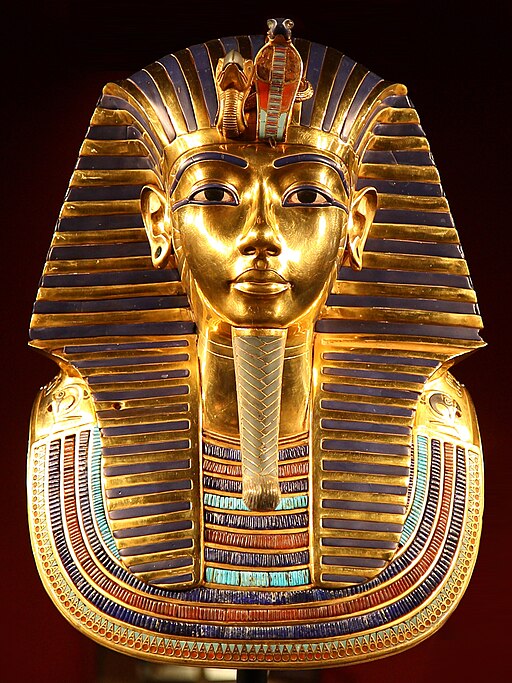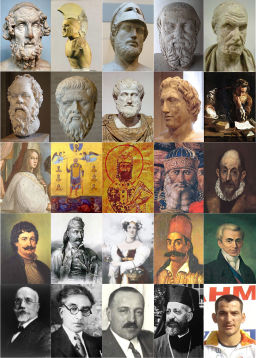
“Echo and Narcissus” by John William Waterhouse depicts Narcissus, a beautiful youth who rejected all the nymphs and women who fell in love with him. Instead fell in love with his reflection.
The story is based on a myth from Ovid’s Metamorphoses, a Latin mythological epic. In the tale, the mountain nymph Echo falls in love with Narcissus. Narcissus, however, rejects her love.
The nymph Echo, who was so upset by his rejection that she withdrew from life and wasted away until all that was left was a whisper. Her prayers were heard by the goddess Nemesis, who caused Narcissus to fall in love with his reflection.
Waterhouse shows the scene where Narcissus is tired from the hunting, and the heat rests by a spring, and while drinking, “a new thirst grows inside him,” and he is “captivated by the image of the beauty he sees.”
He falls deeply in love with “all the things for which he is admired.” He then wastes away with love for himself, echoing the response that Echo had earlier.
He continued to look at his reflection until he died. A narcissus flower grew on the spot where he died. The pale flower is still found near river banks so that it can be reflected in the water.
The poem “Echo and Narcissus” by Ovid was written during the Augustan Age. However, both Echo and Narcissus originated from much earlier Greek mythology.
Narcissus’s myth had inspired artists for at least two thousand years, even before the Roman poet Ovid featured a version in his Metamorphoses.
In more recent centuries, poets such as Keats and painters such as Caravaggio, Poussin, Turner, Dalí, and Waterhouse have all created artworks inspired by Narcissus’s myth.
Echo
In Greek mythology, Echo was a mountain nymph who resided on Mount Cithaeron in central Greece. Zeus loved consorting with beautiful nymphs and often visited them on Earth.
Eventually, Zeus’s wife, Hera, became suspicious and came down from Mt. Olympus to catch Zeus with the nymphs.
Echo endured Hera’s wrath because she tries to protect Zeus, and Hera cursed her only to be able to speak the last words spoken to her.
So when Echo met Narcissus and fell in love with him, she was unable to tell him how she felt and was forced to watch him as he fell in love with himself.
Narcissus
In Greek mythology, Narcissus was a hunter known for his beauty and who loved everything beautiful.
Narcissus was proud and had disdain for those who loved him, causing some to commit suicide to prove their unrelenting devotion to his striking beauty.
Narcissus is the origin of narcissism, a fixation with oneself, and for their physical appearance or public perception.
Metamorphoses
The Metamorphoses, which in Latin means “Books of Transformations,” is a Latin narrative poem by the Roman poet Ovid. The book comprises over 250 myths.
The poems chronicle the world’s history from its creation to the deification of Julius Caesar within a mythical framework.
One of the most influential works in Western culture, the Metamorphoses, has inspired such authors as Dante Alighieri, Giovanni Boccaccio, Geoffrey Chaucer, and William Shakespeare.
Numerous episodes from the poem have been depicted in acclaimed works of sculpture, painting, and music.
Ovid
Publius Ovidius Naso ( 43 BC – 18 AD), known as Ovid, was a Roman poet who lived during Augustus’s reign. He was a contemporary of the older Virgil and Horace and enjoyed enormous popularity.
However, after displeasing Augustus, he was sent into exile in a remote province on the Black Sea, where he remained until his death.
Ovid himself attributes his exile to “a poem and a mistake,” but his discretion in discussing the causes has resulted in much speculation.
His poetry was imitated during Late Antiquity and the Middle Ages and greatly influenced Western art and literature. His Metamorphoses remains one of the most important sources of classical mythology.
John William Waterhouse
Waterhouse worked in the Pre-Raphaelite style, several decades after the breakup of the Pre-Raphaelite Brotherhood, which included artists such as Dante Gabriel Rossetti, John Everett Millais, and William Holman Hunt.
Waterhouse embraced the Pre-Raphaelite style even though it had gone out of fashion in the British art scene by painting this painting.
He painted over 200 works, mainly in the genres of classical mythology and historical or literary subjects.
Echo and Narcissus
- Title: Echo and Narcissus
- Artist: John William Waterhouse
- Medium: Oil on canvas
- Date: 1882
- Dimensions: Height: 1,092 mm (42.99 ″); Width: 1,892 mm (74.48 ″)
- Type: Mythological Art, Pre-Raphaelite
- Museum: Walker Art Gallery
John William Waterhouse
- Name: John William Waterhouse
- Movement: Pre-Raphaelite
- Born: 1849 – Rome, Papal States
- Died: 1917 (aged 67) – London, England, United Kingdom
- Nationality: British
- Notable works:
- The Lady of Shalott
- The Favorites of the Emperor Honorius
- Circe Invidiosa
- Diogenes
- I Am Half-Sick of Shadows, Said the Lady of Shalott
- Hylas and the Nymphs
- Echo and Narcissus
- Ulysses and the Sirens
- Consulting the Oracle
- A Tale from the Decameron
- Circe Offering the Cup to Ulysses
- Saint Eulalia
- Fair Rosamund
- Lamia
Narcissus: Echo & Narcissus A Tragic Tale of Vanity
Echo and Narcissus: Greek mythology
A Virtual Tour of Pre-Raphaelite Artists
John Everett Millais
- Isabella
- Christ in the House of His Parents
- The Martyr of Solway
- Ophelia
- Blow Blow Thou Wind
- The Black Brunswicker
- A Dream of the Past: Sir Isumbras at the Ford
William Holman Hunt
- Our English Coasts
- Isabella and the Pot of Basil
- Self-portrait William Holman Hunt
- Sheltering a Christian Missionary from the Persecution of the Druids
Dante Gabriel Rossetti
- Lady Lilith
- Dante’s Dream
- Dante Gabriel Rossetti – Self Portrait
- The Beloved
- Bocca Baciata
- Paolo and Francesca da Rimini
- The Day Dream
John William Waterhouse
- The Lady of Shalott
- The Favorites of the Emperor Honorius
- Circe Invidiosa
- Diogenes
- I Am Half-Sick of Shadows, Said the Lady of Shalott
- Hylas and the Nymphs
- Echo and Narcissus
- Ulysses and the Sirens
- Consulting the Oracle
- A Tale from the Decameron
- Circe Offering the Cup to Ulysses
- Saint Eulalia
- Fair Rosamund
Echo
~~~
“You shall still have the last word, but no power to speak first.”
– Hera to Echo
~~~
Photo Credit: John William Waterhouse [Public domain]
Popular this Week








 Sponsor your Favorite Page
Sponsor your Favorite Page SEARCH Search for: Search Follow UsJoin – The JOM Membership Program
Sponsor a Masterpiece with YOUR NAME CHOICE for $5
Share this:
- Tweet
